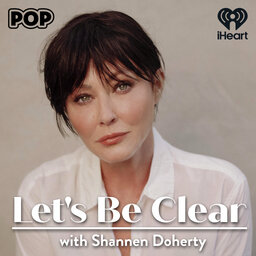Let's Be Real about Cancer and Marriage...with Real Housewife Guerdy Abraira
Housewife of Miami Guerdy Abraira hosts this episode of 'Let's Be Clear' with her husband Russell right by her side.The high school sweethearts talk candidly about her breast cancer diagnosis, his role as caretaker, and the toll cancer took on their marriage. Plus, Guerdy offers words of wisdom to her fellow 'Breasties' and details the empowering moment she decided to take control and say 'No Hair, Don't Care!"
In 1 playlist(s)
Let's Be Clear with Shannen Doherty
Let’s Be Clear… a new podcast from Shannen Doherty. The actress will open up like never before in…Social links
Follow podcast
Recent clips

Let's Get Real with Selma Blair and Amanda Kloots
41:24

Let's Find our Second Wind...with Marion Jones
39:09

Let's Find The Prescription for Joy...with Dr. Tiffany Moon
33:00
 Let's Be Clear with Shannen Doherty
Let's Be Clear with Shannen Doherty